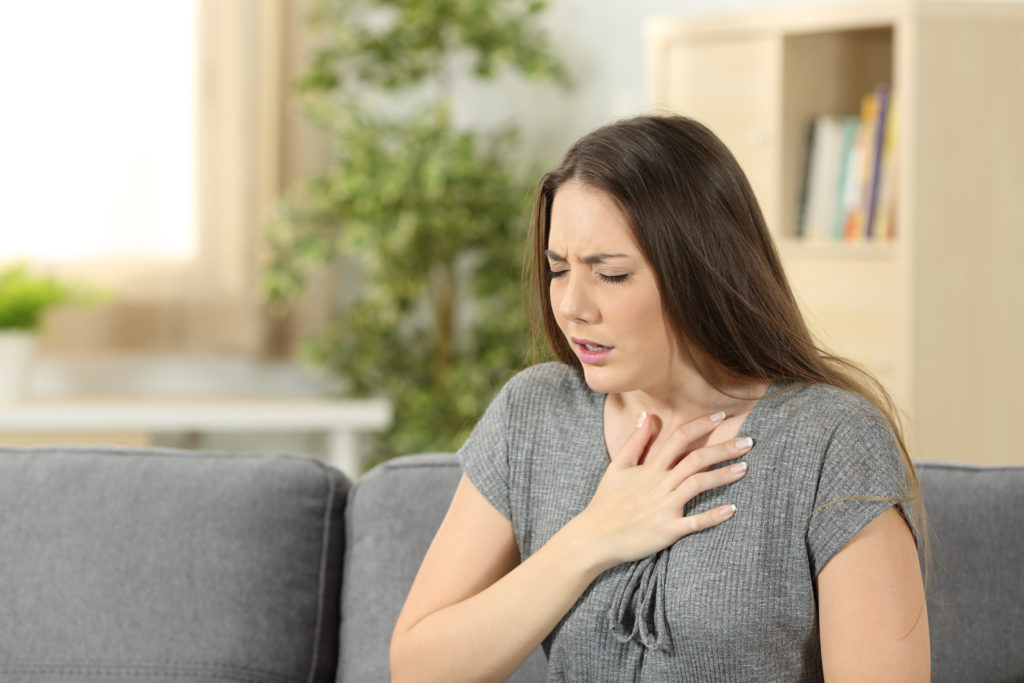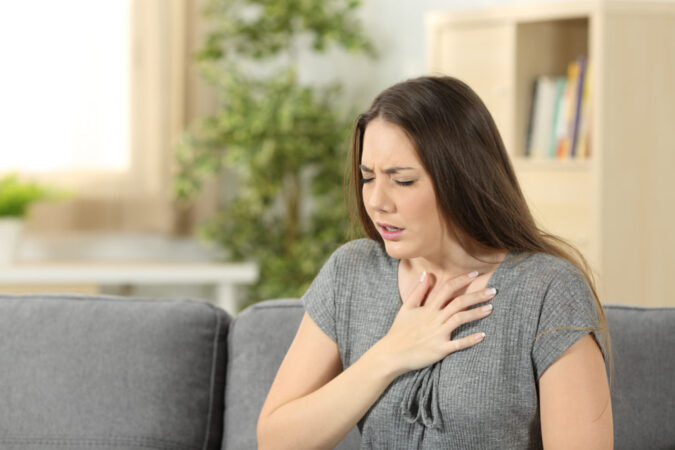Chest tightness and shortness of breath come together many people consider a dangerous sign in the body because it is a heart attack symptom.
Many things can cause chest tightness and shortness of breath, which are not always life-threatening.
So, how do you find out the cause and what steps need to be taken to treat it?

What causes a tight chest and difficulty breathing?
A tight chest can make it difficult for you to inhale or exhale.
If this is the case, try not to panic right away because it can make it even more difficult for you to breathe.
Observe first the tightness you feel. There is a difference between shortness of breath due to a heart attack and shortness of breath due to respiratory problems or other conditions.
For more details, see the explanation of the following medical conditions that can cause chest tightness.
1. Asthma
Asthma is one of the most common causes of chest tightness and shortness of breath.
If your shortness of breath is followed by wheezing (breathing sounds), shortness of breath at night, and coughing, this is most likely a sign of asthma.

Asthma has been closely related to congenital diseases since childhood. However, adults with no history of asthma can also have an asthma attack for the first time in adulthood.
Asthma causes the airways to swell and narrow, causing shortness of breath.
2. Angina
Angina is the cause of chest tightness and shortness of breath because the heart muscle does not receive enough oxygenated blood.
The most common symptom of angina is chest pain that feels like it is being squeezed or squeezed tightly.
This condition can be triggered by strenuous exercise or stress. Chest pain will subside with rest.
However, angina is not a disease. That is a symptom of an underlying heart problem, usually coronary heart disease.
3. Panic attack
Chest tightness and shortness of breath that come on suddenly, but you’re not doing strenuous physical activity, can be signs of a panic attack.

Generally, panic attacks or anxiety will cause a person to hyperventilate.
Hyperventilation is a condition when you inhale a lot of oxygen and exhale quickly and shortly at one time.
That causes carbon dioxide levels to drop drastically, causing constriction of blood vessels.
4. Pulmonary embolism
This disease causes blood flow to one or both sides of the lungs to be very limited, making the chest tight and short of breath so that the heart rate increases.
Symptoms of chest tightness due to pulmonary embolism usually occur suddenly.
Pulmonary embolism is most often caused by deep vein thrombosis, a blood clot in a vein.
The blockage that causes a pulmonary embolism begins in the legs or pelvis.
When the clot travels to the lungs, the veins become blocked, which can cause severe breathing problems.
5. Tuberculosis
Signs and symptoms of tuberculosis usually develop slowly, can take months to years, and are often associated with other conditions.
TB-causing bacteria that attack the lungs cause a chronic (continuous) cough that can produce white phlegm in the morning.
Another common symptom of TB is chest tightness.
These symptoms may result from a pleural effusion or fluid pooling between the lung lining and the chest wall’s protective layer.
6. Chronic obstructive pulmonary disease (COPD)

COPD can cause a chronic cough that produces phlegm, wheezing (breathing sounds), shortness of breath, and other symptoms.
Chest tightness due to COPD is caused by narrowing or blockage of the airways.
Chest tightness and shortness of breath make it difficult for the lungs to breathe or exhale.
7. Bronchiectasis
The airway damage that causes bronchiectasis begins in childhood.
However, symptoms may not appear for months to even years after you start having recurrent lung infections.
The following are some of the symptoms of bronchiectasis that can appear.
- Chronic cough with phlegm.
- Coughing up blood or pus in the phlegm.
- Shortness of breath and wheezing.
- Chest pain.
- A clubbing finger is a thickening of the fingernails and toenails.
Bronchiectasis that is very severe and untreated can lead to heart failure.
8. Pneumonia
Signs and symptoms of pneumonia can vary from mild to severe.
It depends on the type of germ that causes the infection, your age, and your overall health.
Pneumonia often comes on suddenly, causing symptoms similar to the flu and colds but lasting longer.
This lung infection also causes pleuritic chest pain. It means that inflammation or irritation of the lining of the lungs can cause chest tightness when breathing, coughing, or sneezing.
9. Lung cancer
Most lung cancers do not cause symptoms until the malignant tumour has spread.
However, some people with early lung cancer may also show symptoms.
According to the American Cancer Society website, the most common symptoms of lung cancer are:
- chronic cough that does not go away or gets worse,
- chest tightness that gets worse when you take a deep breath, cough, or laugh,
- hoarseness,
- drastic weight loss and no appetite,
- hard to breathe,
- weak, tired, and lethargic,
- have infections such as bronchitis and pneumonia, and
- wheezing sound.
10. Indigestion

Chest tightness and shortness of breath can be caused by digestive disorders, such as acid reflux (GERD).
When food is not digested correctly, the remaining food can go back into the oesophagus, causing chest heaviness and heat.
Indigestion can occur due to poor diet, stress, smoking, and drinking alcohol.
It can also be caused by excess caffeine and spicy or fatty foods.
Remedies for tight chest and shortness of breath
The conditions above can cause tightness that feels very heavy. You can overcome symptoms like this with some medication.
How to deal with these symptoms depends on the cause. For lung conditions such as asthma and COPD, treatments include:
- drugs such as bronchodilators and corticosteroids to reduce the inflammatory process and open the airways,
- pulmonary rehabilitation, and
- oxygen therapy.
For respiratory infections, treatment includes:
- antibiotics if caused by bacterial infection,
- nasal decongestants or steroid sprays, and
- antihistamines to reduce inflammation in the nasal passages.
Chest tightness and shortness of breath are unbearable, requiring medical attention as soon as possible.




